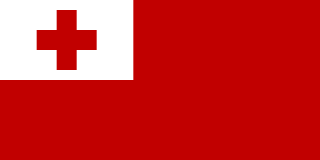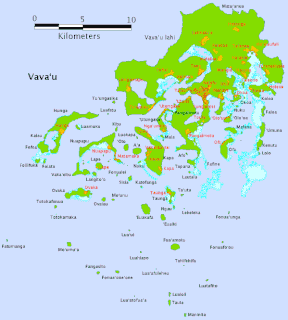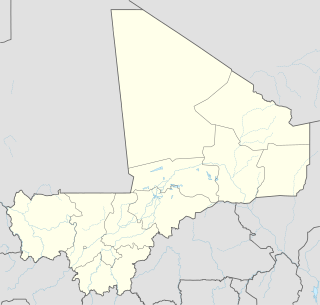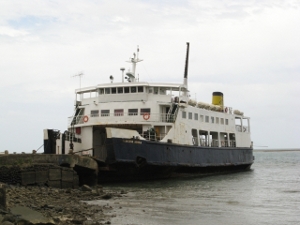
Tonga, officially the Kingdom of Tonga, is a Polynesian sovereign state and archipelago comprising 169 islands, of which 36 are inhabited. The total surface area is about 750 square kilometres (290 sq mi) scattered over 700,000 square kilometres (270,000 sq mi) of the southern Pacific Ocean. The state has a population of 100,651 people, of whom 70% reside on the main island of Tongatapu.

The history of Tonga is recorded since the century after 900 BC, when seafarers associated with the Lapita diaspora first settled the islands which now make up the Kingdom of Tonga. Along with Fiji and Samoa, the area served as a gateway into the rest of the Pacific region known as Polynesia. Ancient Tongan mythologies recorded by early European explorers report the islands of 'Ata and Tongatapu as the first islands having been hauled to the surface from the deep ocean by Maui.

His Majesty's Armed Forces (HMAF) is the military of Tonga. It is composed of three operational components and two support elements.

The Minerva Reefs are a group of two submerged atolls located in the Pacific Ocean south of Fiji and Tonga.

The Tonga Rugby Union is the governing body of the sport of rugby union in Tonga. They are members of the Pacific Islands Rugby Alliance (PIRA) along with Fiji and Samoa. There is a rugby union playing population of less than 800 out of a total population of 100,000.

The Tuʻi Tonga Empire, or Tongan Empire, are descriptions sometimes given to Tongan expansionism and projected hegemony in Oceania which began around 950 CE, reaching its peak during the period 1200–1500.
Tonga (Chitonga), also known as Zambezi, is a Bantu language primarily spoken by the Tonga people who live mainly in the Southern and Western provinces of Zambia, and in northern Zimbabwe, with a few in Mozambique. The language is also spoken by the Iwe, Toka and Leya people, and perhaps by the Kafwe Twa, as well as many bilingual Zambians and Zimbabweans.

Vavaʻu is the island group of one large island and 40 smaller ones in Tonga. It is part of Vavaʻu District which includes several other individual islands. According to tradition the Maui god fished up both Tongatapu and Vavaʻu but put a little more effort into the former. Vavaʻu rises 204 metres (669 ft) above sea level at Mount Talau. The capital is Neiafu, which is the fifth largest city in Tonga, situated at the Port of Refuge.

Tonga sent a delegation to compete at the 2000 Summer Olympics in Sydney, Australia from 15 September to 1 October 2000. Sydney was Tonga's fifth consecutive appearance at a Summer Olympic Games. The Tongan delegation to Sydney consisted of two track and field athletes; Toluta'u Koula and Ana Siulolo Liku; and weightlifter Tevita Kofe Ngalu. Neither of the track athletes advanced beyond the first round of their events, while Ngalu came 13th in the men's 105 kg category.
The Datec Cup Provincial Championship is the highest level of rugby union football competition within Tongan rugby and is a stepping stone for local players into international rugby union.

Koula is a small town and commune in the Cercle of Koulikoro in the Koulikoro Region of north-western Mali. As of 2008 the commune had a population of 17953. It is located 18 kilometres from Koulikoro city.

The MV Princess Ashika was an inter-island ferry which operated in the South Pacific kingdom of Tonga. This motorized vessel (MV) was built in 1972, and began sailing the Tongan route on 7 July 2009 only to sink less than a month later on 5 August. Official figures released by Operation Ashika on 19 August 2009, confirmed that 54 men were rescued, and 74 people were lost at sea. These include two bodies recovered and 72 missing, including five foreign nationals. Two of the missing passengers remain unidentified.

The Tongan Maritime Force is the main arm of the Tonga Defence Services.
Amatasi are a type of Samoan double outrigger canoe watercraft. Its sails were woven pandanus leaves tied to 2 spars. The hull was sometimes built of planks. Lashed together, large double canoes 30–60 feet long could carry 25 men on journeys of hundreds of miles.
The 1982 season of the Tongan A Grade was the 9th season of top flight association football competition in Tonga. Ngeleʻia FC won the championship for the first time, their first title in a then-record of 7 consecutive championships. The season began on January 30, 1982 and all matches were played on a Saturday at Mala'e Pangai.
The Guardian-class patrol boats are a class of small patrol vessels designed and built in Australia for small Pacific Ocean countries.

VOEA Neiafu (P201) is a Pacific Forum patrol vessel operated by Tonga since 1989.

VOEA Ngahau Koula (P301) is a Guardian-class patrol vessel designed and built for the Tonga Maritime Force by Australia. After the United Nations Convention on the Law of the Sea established that all maritime nation were entitled to exercise control over a 200-kilometre (120 mi) exclusive economic zone, Australia agreed to give small patrol boats to Tonga and eleven other neighbours in the Pacific Islands Forum.
This page is based on this
Wikipedia article Text is available under the
CC BY-SA 4.0 license; additional terms may apply.
Images, videos and audio are available under their respective licenses.











